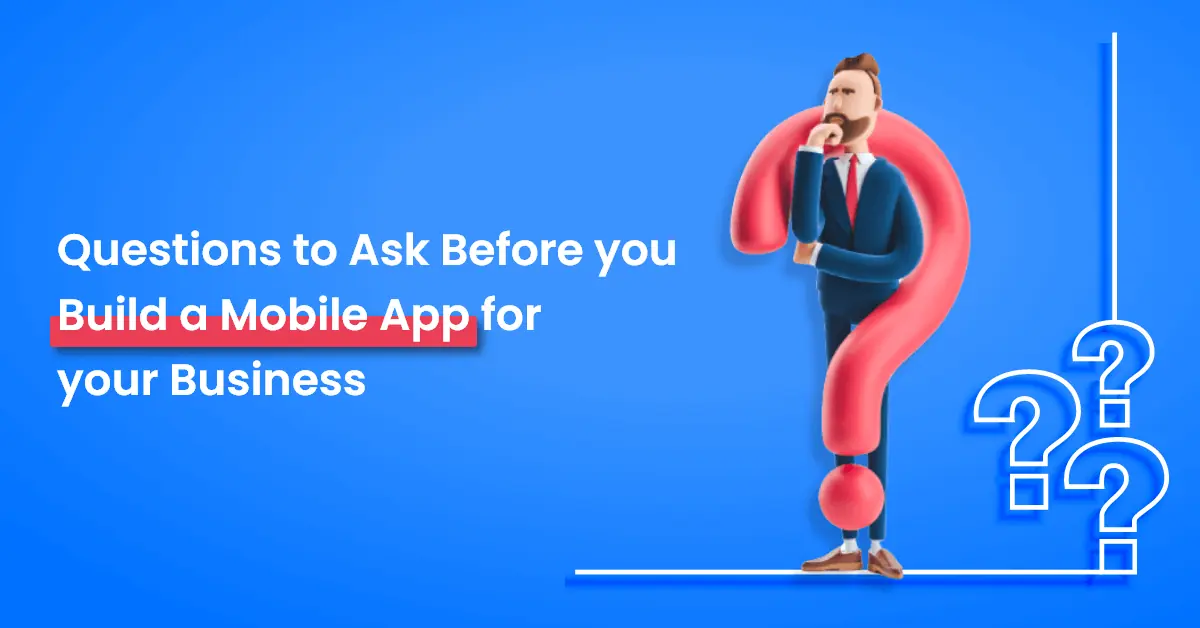10 Questions to Ask Before you Build a Mobile App for your Business

Is your mobile app development project intended to automate your recurring tasks or to optimize your business processes? Will it serve to retain your customers and offer them additional service?
Is creating your mobile application a growth lever for your business? Is it created for your customers, partners, and/or employees?
It is, therefore, not a project to be taken lightly. It will cost you a certain budget. Not to mention the time invested in carrying it out and the efforts in app store optimization.
In order to prevent mobile app development risks, you need a solid foundation.
With nearly a decade of experience, we have created a list of mobile app development questions that you need to consider before creating the prototype of your app and questions to ask when developing an app.
Question 1: What Will Your Application Be Used for?
There are as many ideas as possible mobile applications, that’s why it is necessary to define precisely the objectives that yours will have to fulfill vis-à-vis your target. Will your application be aimed at finding information, facilitating data entry, connecting people, playing games, or sharing information?
You must questions to ask when developing an app in order to find the most sought-after tool by your target. But also, so as not to end up drowned in the blinds because your idea already exists in dozens of other applications. This minimizes your mobile app development risks to quite an extent.

Question 2: Who Will Your Mobile Application Be Used for?
It is very important to collect the real issues of your audience in order to fully understand them. But above all, to meet its needs through your mobile application.
It is therefore essential to describe your target with the greatest care and as detailed as possible. Answer the following questions to help you: Who? What? Or? How? What? When? Why?
These allow them to better understand their behaviour, needs, concerns, moods, etc. It is then easier to adapt the content and functionalities of your mobile application development project according to each profile.
The more you segment your target, the more personas you create. However, if you are just starting out, we recommend that you start with 2-3 personas. Do not spread yourself too thin at the risk of wasting time and money.
The two combined together – the persona of your ideal user and that of the user to avoid – then you have a target for your mobile project.
Question 3: What are the Benefits for My Business?
There are 2 main gains that can push you to build a mobile application for your business
Development of your brand image – Your mobile application becomes the showcase of your business. It’s a good way to get people talking about you in the media.
Your mobile app not only helps rejuvenate your brand image is rejuvenated but also places your business earlier in the purchasing journey of your prospects. You adapt to their lifestyle; you are able to meet the new needs of your consumers.
Improve your productivity – A mobile application can bring many benefits to your business. And one of the main ones concerns the increased efficiency of your employees.
Certain factors influence this result:
- Regular communication between employees: internal instant messaging, intranets or social CRMs
- Ease in teamwork: communication leads to information sharing between employees. The more informed your teams are, the more quickly they can inform your customers, suppliers, and partners.
Due to the fact that your sales force is much more efficient in the field, the routes are then optimized, access to information is instantaneous. In short, everything is improved in order to save time and therefore money.
Question 4: What Type of Application to Choose?
It’s time to think about what kind of apps you will solve your customers’ problems. There are several possibilities: native mobile application, hybrid mobile application, or web applications.
A native mobile application is developed specifically for an operating system. As a rule, it is developed for the most popular systems: iOS for Apple Store, Android for Google Play, and Windows for Windows Store. The native application is therefore only available for download on these different mobile platforms. It offers functions that are specific to it and you have to invest in app store optimization.
A web application is available from the user’s web browser. It offers you many possibilities, particularly in terms of user management, for example, or the management of various information. It does not require data storage capacity on your phone or tablet. However, it also has some drawbacks. In particular by the fact that the user is often obliged to have an internet connection to use it.
A cross-platform mobile application is on the borderline between the web application and the native application. Only one version is developed for all platforms. It is a less expensive solution than the previous ones because its maintenance is simplified by the fact that you update only one version. But it also brings its share of disadvantages. The performance of the application will not be suitable for all mobile platforms, so it will be less stable. You will also be restricted in terms of functionality.
Question 5: How to Create Your Mobile Application to Maximize Its UX?UX covers all aspects of the user experience with your application, including design, user interface, physical and manual interactions.
Here are some questions to ask yourself in order to improve the user experience:
- Will your users be using your app with one or two hands instead?
- Will the app be used on smartphones, tablets, or both?
- Will they be in motion when in use?
- Is the application adapted to the knowledge of the target audience?
- Are the buttons visible enough and big enough?
- Does the graphic design make you want to continue browsing the application?
By asking yourself all of these questions to ask when developing an app, you increase the chances that your app will not be uninstalled after a few minutes of user use.
Question 6: Which Operating System to Use?
Each operating system has its characteristics and constraints that differentiate it from its competitors. Here is the list of elements to take into account when making your choice:
- SEO keys (name, keywords, graphic elements, etc.)
- The price of the stores
- The audience of each store
- Terms of use
- The cost of developing your mobile application
- Backward compatibility of smartphones
Question 7: What Features for Your Mobile Application?
In terms of functionality, there is an infinite number of possible combinations (sharing on social networks, geolocation, access to contacts, NFC, electronic signature). But are they all really essential? Will your target customer be interested in using these features?
If you have any doubts, it would be relevant to create an application that works but does not have all of its features. This is what we call an MVP (Minimum Viable Product).
The MVP application is not a “minimal application” nor an application with all the features. The MVP application will also allow you to launch faster and less expensive to learn from your users’ feedback and thus improve your mobile application.
It will make it possible to confirm or refute your development hypotheses for your next versions and confirm or stop you in your idea in order to limit your financial and mobile app development risks.
Question 8: How Often Will the Application Be Updated?Your application will need to evolve over time in order to be up to date with new regulations or simply to continue to interest your customers.
If you need to regularly change the information in your mobile application. The back office is for you. It is a management space that allows you to manage, for example, the accesses of your users, a database of reservations, your customers’ orders, etc.
On the contrary, if you do not intend to collect information or regularly update your application. It is more interesting to let your web-based solution provider company make big changes, add features, etc. This service will, of course, be billed according to the extent of the change.
Question 9: How Will You Make Your Mobile Application Profitable?
Several strategies can be considered:
- A free application, without profit motive – Free application with advertiser spaces in order to make profitable its creation through paid advertising. Please note that for companies to pay for your advertising space, your application must already generate high traffic
- Freemium model – freemium is a commercial strategy combining a free offer, in open access, and a premium offer, more upscale in paid access. This is common for application editors who often see freemium as a lever for making the free version profitable.
- In-app purchases – pair your application with a complementary paid application from a partner, for example.
There are many other ways to make your mobile application profitable. You need to find the one that is most likely to hit your target.
Question 10: Which Provider to Choose to Develop Your Mobile Application?
Choosing the right mobile and web-based solution provider company is essential to obtain a mobile application that meets your expectations. To take this step lightly would be a serious mistake.
A good mobile development company will, in fact, follow you throughout your project. They should help you evolve and grow your project. To avoid risks, here’s a selection criterion that you can apply when looking for a provider.
- References and customer testimonials
- Expertise in mobile app development
- The technologies used
- The proposed cost
- Deadlines
- Post-development support and maintenance

To Conclude
As you can see, putting your application online does not mean the end of the battle. On the contrary, it is at this moment that you will have to double your efforts so that all your work is not in vain. App store optimization is a must and you should choose a mobile development company that can help you with it. All these elements require time and also for certain points, technical expertise. If you are feeling overwhelmed, we can help.
OneClick is an expert in the development and maintenance of tailor-made applications and can indeed assist you in the realization of your mobile application project. Contact our experts for a demo or quote for your app development project.





